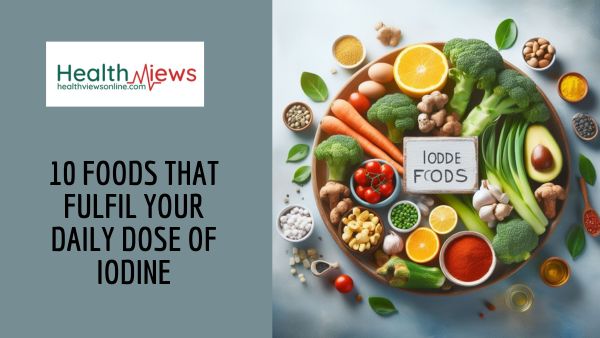Iodine is a trace mineral that is mostly found in seafood. It’s an important micronutrient, which means your body requires it to function properly. Iodine is a black, lustrous stone or a purple dye on its own. However, it is typically present in trace levels in water and soil, or as a component of other substances in food.
Iodine is used by your body to power several critical bodily processes. While iodine supplements are available, iodine is also regularly fortified in other foods. Iodine insufficiency is uncommon in areas where iodine fortification is popular.
For the majority of individuals, the recommended daily intake (RDI) for iodine is 150 mcg per day. These requirements are more high for pregnant or nursing women.
This article focuses on ten iodine-rich foods that can not only fulfil your daily dose of Iodine but also help prevent a deficiency.
Also, Read Know All About Fat: Functions, Recommended Amount, Sources
1. Milk
Iodine is found in raw milk. For example, one cup of nonfat cow’s milk contains 85 mcg on average, which is more than half the RDI.
Despite this, according to an abstract from a 2017 study, the actual iodine concentration in milk products fluctuates substantially. Milk yield, season, and teat-dipping with iodine-containing disinfectants are all factors that influence overall concentration. This means that the amount of iodine in milk varies. Source
2. Iodized salt
Iodized salt is perhaps the most common and abundant source of iodine in the average person’s diet. To get the RDI of iodine, take a little more than half a teaspoon of iodized salt.
This is one of the most convenient and cost-effective methods of preventing iodine deficiency. It is an especially good supply of iodine for persons who eat a plant-based diet, as plant foods are often low in iodine. Source
3. Eggs
Iodine is also abundant in eggs. One entire egg contains less than 100 calories and provides a lean supply of protein, healthy fats, and a variety of vitamins and minerals. Egg yolks are a good source of iodine since it is added to chicken feed. However, because the amount of iodine in chicken feed varies, so does the amount detected in eggs.
One large egg provides approximately 24 mcg of iodine or 16% of the recommended requirement. Source
4. Prunes
Prunes are essentially dried plums. Prunes are an excellent source of iodine for vegetarians and vegans. Five dried prunes provide 13 mcg of iodine or approximately 9% of the recommended requirement. Source
Prunes are popular for their effectiveness in treating constipation. This is due to their high fiber and sorbitol content, which is a kind of sugar alcohol. Prunes include a variety of vitamins and nutrients, including vitamin K, vitamin A, potassium, and iron.
Also Read: Prunes: The No. 1 Solution for Constipation and Improved Bowel Movements
5. Himalayan Pink salt
Himalayan pink rock salt is a naturally occurring, unprocessed commodity that originates from, where else, the foothills of the Himalayas, its iodine level fluctuates. Some salt may have more or less iodine than iodized table salt. Himalayan crystal salt, on the other hand, is all-natural and a better alternative for seasoning your cuisine. Source
6. Dairy
Iodine is abundant in dairy products, particularly in Indian diets. Yogurt is a good dairy source of iodine as well. One cup of plain yogurt contains around half of the daily required amount.
The amount of iodine in cheese varies according to the kind. Cottage cheese is an excellent source of iodine. One cup of cottage cheese contains 65 mcg, while one ounce of cheddar cheese contains approximately 12 mcg. Source
7. Enriched Bread
While bread is rarely high in iodine on its own, some producers prepare it with an “iodate dough conditioner.” These conditioners, like table salt, are used to enrich the bread. Iodine levels in a single slice of white bread baked with an iodate dough conditioner can reach 185 mcg.
8. Seaweed
Seaweed absorbs iodine from seawater and is a good source of it. Other minerals and trace minerals found in sea veggies include calcium, copper, and magnesium. They might have a high protein and fiber content while being low in calories and fat-free. The iodine content in seaweed (kombu, nori, arame, and wakame) varies greatly.
Seaweed contains 232 micrograms (mcg) of naturally occurring iodine per serving. That’s greater than the recommended daily intake (RDI) of 150 mcg for men and non-pregnant women.
Also, Read All about Calcium: Functions, Daily Dose, Deficiency, Sources & Toxicity
9. Organic Potatoes
The common potato is a simple complement to almost any meal, and because many have been biofortified with iodine, it is one of the finest sources of this mineral. Studies show that even after cooking, potato dishes can supply between 33.3 percent and 52.7 percent of your daily required intake. Source
10. Organic Corn
Organic corn can help to increase iodine levels in the body. A half cup of canned corn contains around 14 mg of iodine. This level, like that of other vegetables, may vary depending on where the maize was cultivated. Also, keep in mind that the majority of maize is genetically engineered.
Iodine is an important mineral, yet it is scarce in food. Due to this, many people worldwide are in danger of acquiring a deficiency. Iodine-rich foods include seaweed, dairy, potatoes, corn, and eggs. Furthermore, most table salt has been iodized, making it simple to incorporate iodine into your diet. The foods featured in this article are not only high in iodine, but they’re also incredibly healthy and simple to incorporate into your everyday diet.
Also, watch health views web stories: 8 FOODS THAT FULFILL YOUR VITAMIN C DOSE





